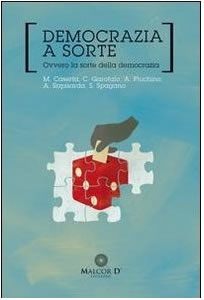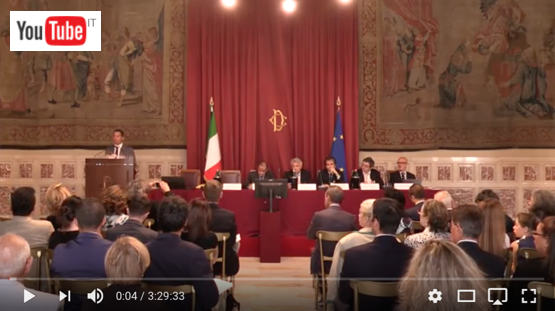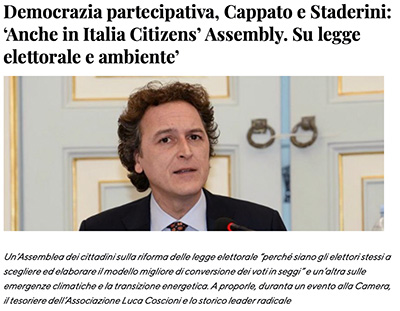Improving Democracy by lot
Why lot? How sortition could help representative democracy
doi.org/10.1016/j.physa.2020.125430
In this paper we present a new analytical model of a Parliament and investigate the beneficial effects of the selection of legislators by lot in order to reduce some of the drawbacks of modern representative democracies. Resorting to sortition for the selection of public officers used to be in the past a popular way of taming factionalism in public affairs. Factionalism is assumed to be detrimental since public officers tend to favour their own faction instead of pursuing the general interest. In this respect our mathematical model shows in a rigorous way how it is possible to improve the efficiency of a Parliament by introducing the use of sortition to select part of its members. It will be shown that, starting from a Parliament working with two parties (or coalitions), where the costs of representative democracy are quite apparent through the detrimental effects of party discipline, one can beneficially move towards a Parliament where independent, randomly selected legislators sit alongside elected members. In particular, we show that increasing the number of independent legislators up to a critical point enhances the efficiency of the Parliament and puts into check the factionalism likely to arise from party discipline.
Accidental Politicians: How Randomly Selected Legislators Can Improve Parliament Efficiency
A.Pluchino, C.Garofalo, A.Rapisarda, S.Spagano, M.Caserta , Physica A 390 (2011) 3944-3954
doi:10.1016/j.physa.2011.06.028
In ancient Greece, the cradle of democracy, governing bodies were largely selected by lot. The aim of this device was to avoid typical degenerations of any representative institution. In modern democracies, however, the standard is choosing representatives by vote through the Party system. Debate over efficiency of Parliament has therefore been centred on voting systems, on their impact on parliamentary performances and, ultimately, on the efficiency of economic system. In this paper, rediscovering the old Greek wisdom and recalling a famous diagram about human nature by C.M.Cipolla, we show how the injection of a measure of randomness improves the efficiency of a parliamentary institution. In particular, we develop an agent based model of a prototypical Parliament and find an analytical expression, whose predictions are confirmed by the simulations, that determines the exact number of randomly selected legislators, in an otherwise elected parliament, required to optimize its aggregate performance (number of approved acts times average social gain) after that free elections would have established the relative percentage of the two Parties or Coalitions. This result is also in line with the recent discovery that, under certain conditions, the adoption of random promotion strategies improves the efficiency of a human hierarchical organization. ....
L'efficienza del caso, Le Scienze Gennaio 2013
"Democrazia a Sorte. Ovvero la sorte della democrazia" (2012) Malcor D' Edizione
Democrazia a Sorte. Quali scenari possibili?
Montecitorio, Roma (21/07/2016)
Citizens' Assembly: un nuovo strumento di democrazia partecipativa
Camera dei Deputati, Roma (15/07/2019)
Interviews and press releases
For more news see also the web site www.oderal.org
- Democracy in Principle (USA, 13/10/2014) "Picking Legislators at Random Would Improve Congress"
- Esquire.ru (RUSSIA, 13/11/2013) "From time to time"
- Improbable Research (USA, 08/03/2011) "Math: Advantage of selecting politicians randomly"
- Technology Review, MIT (USA, 09/03/2011) "Why Randomly-Selected Politicians Would Improve Democracy"
- Visionaire Berichten (Netherlands 10/03/2011) "Random politici verbeteren democratie"
- Galileo. Giornale di Scienza Online (Italy, 11/03/2011) "Scienza made in Italy"
- Neo Fronteras (Espana, 11/03/2011) "Legisladores aleatorios y eficacia"
- Noticias.com (Espana, 13/03/2011) "La democracia mejora con parlamentarios elegidos al azar"
- Spacecollective.org (USA, 14/03/2011) "Randomly selected politicians"
- Equality by Lot: the Blog of the Kleroterians (USA, 16/03/2011)
- ABC News (USA 18/03/2011) "Random selection could 'improve democracy' "
- ABC Sydney (Australia 18/03/2011) "Random selection could 'improve democracy' "
- TopNews (USA 18/03/2011) "Research says randomness could 'improve democracy' "
- Mojasocjologia.pl (Poland 22/03/2011) "Naukowcy: losowanie bardziej sprzyja demokracji niz wybory"
- Hotelslaevi.com (Russia 22/03/2011) "How to make the parliament work more efficient"
- Discovery News (USA 25/03/2011) "Randomly selected leaders may make politics more efficient"
- Science on MSNBC (USA 28/03/2011) "Can randomly selected leaders improve politics?"
- Step1 - Intervista (Italia 21/04/2011) "Quelli dell'IG-Nobel la buttano in politica"
- NWT-Magazine (Netherlands 05/2011) "‘Willekeurig gekozen kamerleden goed voor politiek’"
- D&Democrazy (Spain 05/05/2011) "‘Can randomness improve democrazy?"
- The NonProfit Quarterly (USA 11/05/2011) "Would randomly-selected politicians improve democracy?"
- Edward Willet Blog (Canada 21/05/2011) "The case for accidental politicians"
- ISGTW (CERN, Ginevra 25/05/2011) "The Good, the Bad and the Random"
- To Bhma (Greece 29/05/2011) "Klerotoi ste Boulè"
- Pour la Science.fr (France Sept. 2011) "Hasard et Efficacité"
- TheGuardian (UK April 2012) "Improbable Research: the laws of human stupidity" of Marc Abrahams
- TheGuardian (UK 16/04/12) "Why random selection of MPs may be best" of Marc Abrahams
- Washington Post (USA 17/04/12) "Best way to pick legislators? At random." of Sarah Kliff
- Interactive Democracy (20/04/12) "Randomness could improve democracy"
- As Milésoume Epitélous (Greek 20/04/12) "Klerotè Demokratìa"
- PaperBlog (Italia 22/04/12) "La lotteria della Democrazia"
- Annals of Improbable Research (USA May-June 2012) "Randomness vs. Stupidity"
- 26/04/2013: "Le hasard, avenir de la démocratie" on AgoraVox, Le média citoyen (France)
- 02/09/2013: "Random legislators" on "The primitive Thinking" blog
- 11/07/2014: "Democrazia a sorte: perchè no?" - Presentazione del libro a Modica (RG) su Youtube - 29/05/2014: Una cura per la nostra democrazia malata: può il sorteggio rivitalizzare il processo democratico? (di A.Pluchino e A.Rapisarda)
- 15/06/2014: Dagli autori di “DEMOCRAZIA A SORTE”: Può il sorteggio rivitalizzare il processo democratico? su INTERNAUTA ONLINE
- 01/05/2015: "Come ha funzionato davvero la democrazia liquida dei Pirati tedeschi" di Fabio Chiusi su WIRED.IT
- 02/11/2015: "Un parlamento estratto a sorte sarebbe incorruttibile" di Timo Rieg su SWISSINFO.CH
- 07/05/2016: "La sorte della democrazia" di Lorenzo Guadagnucci sui Blog di MICROMEGA
- 07/11/2017: "Se alle elezioni (siciliane) trionfa l’astensione, troviamo un’alternativa alla democrazia rappresentativa" di Renzo Rosso sul Blog del Fattoquotidiano
- 03/07/2018: "Democrazia a sorte: quali scenari possibili?" di Gianluca Vacca, su "Nomos le attualità nel diritto" e sul Blog di Beppe Grillo
- 15/07/2019: Convegno: "Citizen Assemby: un nuovo strumento di democrazia partecipativa" by Dal Dire al Fare, Noi, (Camera dei Deputati, Roma)
- 15/07/2019: "Democrazia partecipativa, Cappato e Staderini: Anche in Italia citizens' assembly su legge elettorale e ambiente" (Il Fatto Quotidiano)




